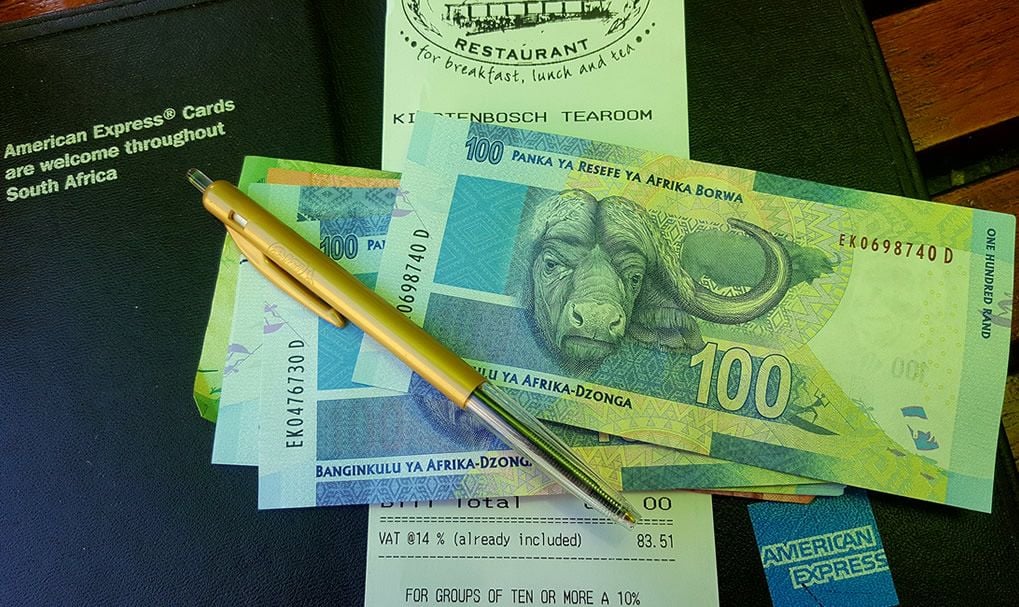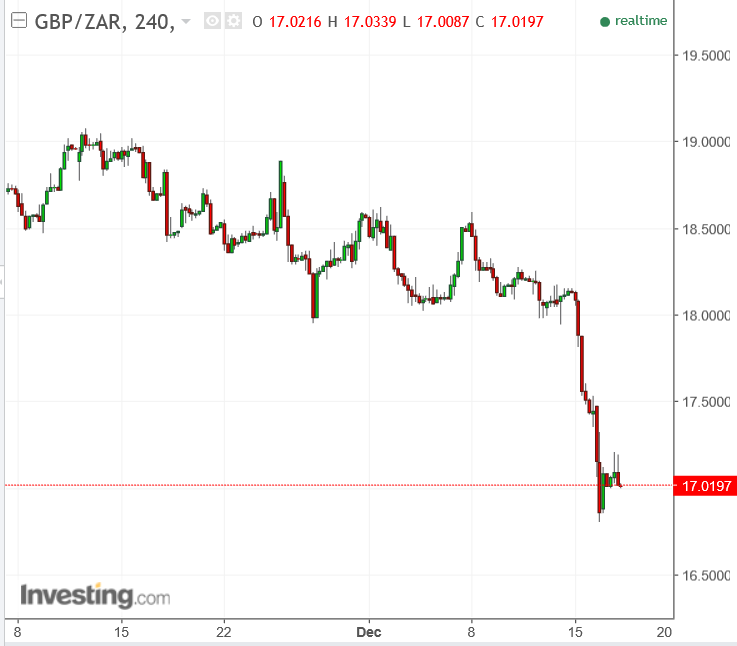The South African Rand is Now Overvalued after Ramaphosa Win and the Work is Only Just Beginning

Cyril Ramaphosa’s election to lead the ANC has spurred the Rand higher and could mean a new dawn in South African politics but how much higher can the currency go?
South Africa’s Rand has risen over 7.0% against a trade-weighted basket of currencies in response to deputy President Cyril Ramaphosa’s election to lead the ruling ANC party, but strategists say it is overvalued and could struggle to rise further.
The Pound-to-Rand exchange rate fell from 18.00 before the leadership vote to a low of 16.80, before trading back up to 17.09 Tuesday.

Above: Pound-to-Rand rate shown at hourly intervals.
Nkosazana Dlamini-Zuma and Ramaphosa were the two front runners in the leadership race, with Ramaphosa seen as the better candidate from the perspective of financial markets, which explains the rally in the Rand before and after the result.
Ramaphosa stood on a platform of cleansing the party of the corruption that has plagued it under previous leader and current President of State Jacob Zuma and was seen as the most likely among candidates to push ahead with much needed economic and political reforms.
The new leader of the ANC will fight the general election in 2019 and, if recent elections are anything to go by, will likely be President one day in the future.
Dlamini-Zuma, the other leadership candidate, is the former wife of Jacob Zuma and so is seen as a status-quo candidate who is highly unlikely to reform the party and, eventually, the government.
Credible leadership and the promise of reform could be the difference between whether Moody’s downgrades South Africa’s local currency credit rating in the first quarter of 2018.
A downgrade will take the South African credit rating beneath investment grade, leading to the country’s exclusion from the coveted World Government Bond Index (WGBI).
This would exclude South African bonds from all investment grade bond funds, which account for the majority of bond investments, and lead to a massive reduction in inbound investment. That could have extreme negative effects on the currency.
The Rand's recovery after Monday’s news has been stymied slightly by the election of candidates for other top positions in the ANC, half of whom are supporters of Dlamini-Zuma, which has clipped some of the good feeling from Ramaphosa's win.
Fears are that the Dlamini-Zuma contingent may block attempts made by Ramaphosa to reform the government and its institutions.
"Given the very mixed slate of the ANC’s new Top Six (3 from CR’s slate, 3 from NDZ’s slate), and the highly questionable track record of several of those members, Ramaphosa’s efforts on rooting out corruption within government may face formidable impediments," says Phoenix Kalen, an economist at Société Générale.
The Rand is Overpriced
The Rand may find further upside difficult to achieve, according to an economist at UBS, who flags that it is now overvalued while others say Monday’s election itself may not be enough to avert a downgrade by Moody’s.
"Ramaphosa's credentials offer hope of a more business-friendly policy agenda going forward. In anticipation of a lower probability of a Moody's downgrade and thus WGBI exclusion in late February/March, we revise our end -2018 USD/ZAR forecast to 14.25 (15.50 previously)," says George Kovacs, an economist at UBS.
A currency is valued by comparing its current market level to estimates of what its 'fair' value is and where it ought to be. These estimates are derived from economist's models using fundamental inputs and when those models show a currency is 'overvalued', analysts will recommend selling it, or just steering clear of it.
"Both our balance of payments-based FEER and cointegration-based BEER metrics suggest the ZAR is now fundamentally overvalued at current levels. At 12.70 on USD/ZAR, our ZAR BEER valuation is roughly 1 standard deviation above historical norms – a point from which mean reversion (to a weaker ZAR) has historically played out over time," says Kovacs.
The hope that Ramaphosa will usher in a period of fiscal and political reform, thus avoiding a Moody's downgrade, is overly optimistic according to Kovacs, who says Ramaphosa may not have the will to cut public spending so close to a general election in 2018.
The elevated Rand provides the South African Reserve Bank (SARB) with the opportunity to cut interest rates, says the analyst - a move which would weaken the Rand.
SocGen's Kalen is more optimistic, saying Ramaphosa’s win will boost business and consumer confidence for months to come but that future benefits to the Rand may be thin on the ground as most of the good news is now priced in. And all of the difficult work remains to be done.
"The road ahead presents serious challenges for Ramaphosa. The election outcome sets the stage for a political showdown between Ramaphosa and Jacob Zuma, as new ANC head and existing country head vie for political relevance," says Kalen.
Get up to 5% more foreign exchange by using a specialist provider by getting closer to the real market rate and avoid the gaping spreads charged by your bank for international payments. Learn more here.
